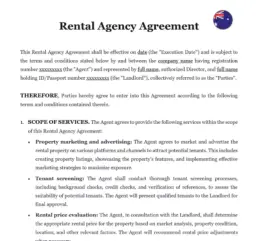The Importance of a Good Property Manager
A competent property manager can make a significant difference in the success of your rental properties. From tenant screening to maintenance, they handle essential tasks that ensure your property remains profitable and well-maintained. This guide outlines the crucial factors to consider when hiring a property manager and emphasizes the importance of having a comprehensive rental agency agreement.
Role of a Property Manager
A property manager acts as a liaison between the landlord and tenants, managing day-to-day operations and ensuring the property is well-maintained. Their responsibilities include:
1. Tenant Screening: Conducting background checks, verifying employment, and checking references to find reliable tenants. This process ensures that tenants are financially responsible and likely to respect the property.
2. Rent Collection: Ensuring timely rent payments and handling any issues related to late payments. A property manager can implement and manage systems for efficient rent collection, which can significantly reduce the occurrence of missed payments.
3. Maintenance and Repairs: Coordinating and supervising necessary repairs and maintenance to keep the property in good condition. This includes both routine maintenance and emergency repairs, ensuring the property remains safe and habitable.
4. Legal Compliance: Ensuring the property complies with all relevant laws and regulations, including safety and health codes. Property managers stay updated on local, state, and federal laws to protect landlords from legal issues.
Benefits of Hiring a Property Manager
Hiring a property manager offers numerous advantages, especially for landlords with multiple properties or those who live far from their rental units. These benefits include:
1. Time Savings: Managing a rental property can be time-consuming. A property manager takes on these responsibilities, freeing up your time for other pursuits or investments. They handle the daily operations, allowing landlords to focus on broader business strategies.
2. Expertise: Property managers have the experience and knowledge to handle various issues that may arise, from legal disputes to maintenance emergencies. Their expertise can prevent costly mistakes and ensure that the property is managed efficiently.
3. Tenant Relations: They can effectively communicate with tenants, addressing their concerns and ensuring a positive rental experience. Good tenant relations lead to higher tenant satisfaction and retention rates.
4. Market Knowledge: Property managers understand the local rental market, helping you set competitive rent prices and attract quality tenants. They can provide valuable insights into market trends, helping landlords maximize rental income.
Key Qualities to Look for in a Property Manager
When hiring a property manager, consider the following qualities to ensure you choose the right candidate:
| ➤ Experience: Look for a property manager with a proven track record in managing properties similar to yours. Experience in your specific market or property type can be invaluable. |
| ➤ Communication Skills: Effective communication is crucial for addressing tenant concerns and keeping you informed about property issues. A property manager should be approachable and responsive to both tenants and landlords. |
| ➤ Organizational Skills: A good property manager should be highly organized, capable of handling multiple tasks efficiently. They should have systems in place for tracking rent payments, maintenance requests, and tenant communications. |
| ➤ Problem-Solving Abilities: They should be able to quickly and effectively resolve issues that arise with tenants or the property. This includes handling emergencies, disputes, and unexpected challenges with professionalism and efficiency. |











